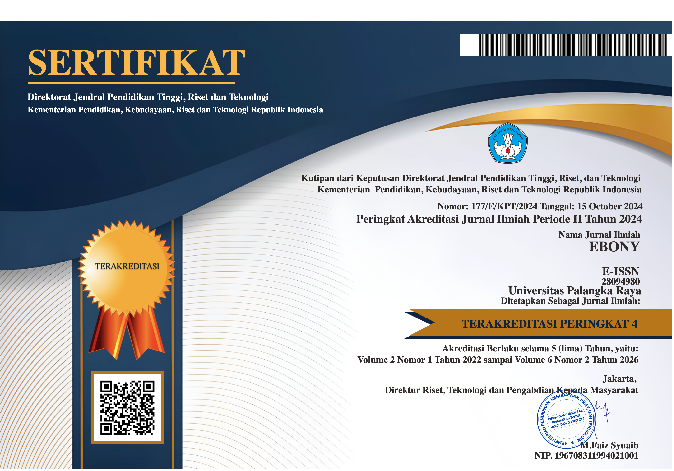Reviewing Teacher Effectiveness in Improving Student Learning
DOI:
https://doi.org/10.37304/ebony.v4i1.12295Keywords:
teacher effectiveness, value-added models, teacher performance, student learning improvementAbstract
This research is dealing with the review of teacher effectiveness in improving student learning. A qualitative research method by using technique of library research was applied in analyzing the data in this research. There are four aspects of teacher effectiveness reviewed by the researchers: firstly, the nature of teacher’s effectiveness; secondly, teacher effectiveness based on the teacher’s performance; thirdly, teacher effectiveness based on the student’s achievement; and fourthly, benefits of teacher effectiveness for improving student learning. The results from four aspects which are reviewed give a comprehensive definition of effective teachers and specific method on how to evaluate teacher effectiveness based on teacher performance such as supervisors’ rating, students’ evaluation of teachers, peer-reviewed assessment, and self-evaluation. In addition, the review also evaluated teacher effectiveness based on student’s achievement in which value-added models were exemplified to the measurement of the effectiveness. Last, beyond teachers’ contribution to student achievement; this library research also includes how effective teachers impact student learning which obviously contribute to important outcomes for students as benefits for learning improvement.
Downloads
References
Barden, M. K. (2014). Teacher Evaluation, Development, and Improvement. Seminar Research Paper Series, 1–22.
Bichi, A. A. (2017). Evaluation of Teacher Performance in Schools: Implication for Sustainable Development Goals. Northwest Journal of Educational Studies, 2, 103–113.
Darling-Hammond, L. (2012). Evaluating Teacher Evaluation. Phi Delta Kappan, 8–15.
Darling-Hammond, L. (2013). Can Value Added Add Value to Teacher Evaluation? Educational Researcher, 44(2), 132–137.
Darling-Hammond, L., & Richardson, N. (2009). Teacher Learning: What Matters? Research Review, 66(5).
David, A. P., & Macayanan, J. V. (2010). Assessment of Teacher Performance. The Assessment Handbook, 3, 65–76.
Goe, L., Bell, C., & Little, O. (2008). Approaches To Evaluating Research Effectiveness: A Research Synthesis.
Goldhaber, D., & Anthony, E. (2004). Can Teacher Quality be Effectively Assessed. In Can Teacher Quality be Effectively Assessed.
Goldstein, J. (2007). Easy to Dance To: Solving the Problems of Teacher Evaluation with Peer Assistance and Review. American Journal of Education, 113, 479–508.
Ko, J., Sammons, P., & Bakkum, L. (2014). Effective Teaching. Education Development Trust.
Kohut, G. F., Burnap, C., & Yon, M. G. (2007). Peer Observation of Teaching: Perceptions of the Observer and the Observed. College Teaching, 55, 19–25.
Little, O., Goe, L., & Bell, C. (2009). A Practical Guide to Evaluate Teacher Effectiveness.
Nhundu, T. J. (1999). Determinants and prevalence of occupational stress among Zimbabwean school administrators. Journal of Educational Administration, 37, 256–272.
Ocave, J. A., & Abulon, E. (2006). Students’ ratings of professors’ competence: An application of the G-Theory. PNU Research Series, 88.
Sawchuk, P. (2015, September 3). Teacher Evaluation: An Issue Overview. Education Week. https://www.edweek.org/teaching-learning/teacher-evaluation-an-issue-overview/2015/09
Schacter, J., Thum, Y. M., & Zifkin, D. (2006). How much does creative teaching enhance elementary school students’ achievement? Journal of Creative Behaviour, 40, 47–72.
Springer, M. G., & Gardner, C. D. (2010). Teacher Pay for Performance: Context, Status, and Direction. Phi Delta Kappan, 91(8), 8–15.
Waring, D. F. (2015). Teacher Evaluations: Use or Misuse? Universal Journal of Educational Research, 3(10), 703–709.
Wiener, R., & Jacobs, A. (2011). Designing and Implementing Teacher Performance Management Systems: Pitfalls and Possibilities.
Yuan, R., Yang, M., & Lee, I. (2021). Preparing pre-service language teachers to teach critical thinking: Can overseas field school experience make a difference? Science Direct, 40.
Zed, M. (2008). Metode Penelitian Kepustakaan. Yayasan Obor Indonesia.
Downloads
Published
How to Cite
Issue
Section
License
Copyright (c) 2024 Iwan Fauzi, Andrian Nuriza Johan

This work is licensed under a Creative Commons Attribution 4.0 International License.











